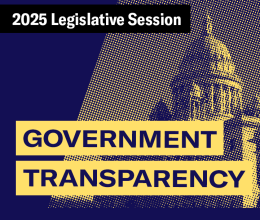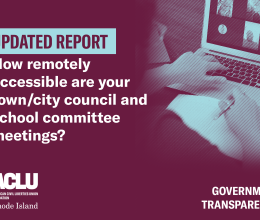In advance of a scheduled Ethics Commission meeting tomorrow which includes a discussion of a proposed rule to establish a moratorium on the filing of ethics complaints before elections, the ACLU of Rhode Island urged the Commission to give “more thorough consideration of the consequences of such an approach.”
In a letter to Commission Chair Ross Cheit, the ACLU acknowledged that “during the heat of election campaigns, some complaints of dubious merit may get filed with the Commission in an attempt to score political points.” But the letter went on to “disagree with the premise that a moratorium is the proper response to this scenario.”
Although there may be an uptick in complaints to the Commission in the months leading up to an election, the ACLU argued that should not be a surprise since that “is the time when people become most engaged in politics and have the greatest interest in holding politicians accountable and in examining their record and conduct.” And even if some complaints are filed then for political reasons, the ACLU argued:
The motivation of a complainant should not be relevant to the Commission’s deliberations. When, for example, the Republican Party files a complaint against a Democratic office-holder, or vice-versa, one can assume that there are, at least in part, political motivations for doing so, but that says nothing about the validity of the complaint. Politically motivated complaints simply are not synonymous with unwarranted complaints.
The letter further noted that, even in trying to address complaints without merit:
[While] a moratorium eliminates the filing of frivolous complaints, it bars the filing of any meritorious complaints as well. It strikes us as strange, to say the least, to have a state agency designed to investigate ethics complaints put up a “Closed for Business” sign during what should be the busiest time of the year. To do so because some of the complaints it receives may not be valid is the quintessential example of throwing the baby out with the bathwater.
Calling the ability of citizens to file complaints “central to their First Amendment right to petition government for the redress of grievances,” the ACLU said “a moratorium would undercut this important principle.” The ACLU urged the Commission to instead consider other approaches, such as “quicker dispositive action by the Commission to promptly weed out frivolous allegations, and a public acknowledgement that mere acceptance of a complaint says nothing about its validity. They may not eliminate the problem, but they do much less harm to the public’s petition rights and the Commission’s mission.”
A copy of the ACLU’s letter is available online.





